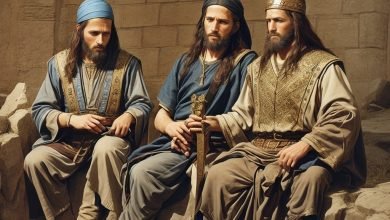
Who is Jacob in the Bible and why did he wrestle with God?
Jacob in the Bible is one of the heroes who exemplifies God’s power and grace in transforming and recreating a person. He is most known for his cunning and deceit, especially towards his twin brother Esau. However, after losing in a wrestling match with God, Jacob was blessed and given a new name.
فرست محتوا
- 1 Where is Jacob in the Bible? (Jacob in the Bible)
- 2
- 3 What Does the Name Jacob Mean in the Bible?
- 4 Interesting Facts about Jacob in the Bible
- 5 Why Did Jacob Wrestle with God? (Jacob in the Bible)
- 6 The Meaning and Significance of Israel, Jacob’s New Name in the Bible
- 7 Why is Jacob’s Story in the Bible Still Valuable?
Where is Jacob in the Bible? (Jacob in the Bible)
Jacob is mentioned in the Book of Genesis, chapter 25. When Rebekah, Jacob’s mother, was pregnant with him and his twin brother Esau, she asked God why her two children were struggling within her womb (Genesis 25:22).
The Lord replied that the enmity between the two brothers foretold the emergence of two nations from them—Jacob would be the ancestor of Israel (Genesis 32:28, Genesis 35:10-13), and Esau the ancestor of Edom (Genesis 36).
Moreover, Esau, the elder twin, would serve Jacob, the younger (Genesis 25:23).
Read more : The story of Solomon in the Bible and his destiny
What Does the Name Jacob Mean in the Bible?
The name Jacob in the Bible is derived from the Hebrew verb that means “to follow.” At birth, Jacob was holding onto his twin brother Esau’s heel. Hence, in Hebrew, Jacob means “one who follows another” (Genesis 25:26).
Additionally, Jacob’s attempts to seize his brother’s birthright and blessing earned him the title of “deceiver” (Genesis 27:36).
How is Jacob’s Character Portrayed in the Bible?
From birth until his wrestling encounter with God (Genesis 32:24-29), Jacob was known for his cunning and deceit.
Jacob’s most notorious acts of deception were against his twin brother Esau. Jacob traded a bowl of stew to his “famished” brother for Esau’s birthright, which included a double portion of their father Isaac’s inheritance (Genesis 25:29-34). Furthermore, Jacob deceitfully took their father’s blessing intended for Esau (Genesis 27:1-29, Genesis 27:35).
Jacob also deceived his uncle Laban. For twenty years of service, Jacob used peeled branches of poplar, almond, and plane trees placed in the watering troughs to influence the breeding of Laban’s flock, ensuring the strongest animals produced speckled and spotted offspring, which Laban had agreed to give Jacob as his wages (Genesis 30:25-43).
Interesting Facts about Jacob in the Bible
Jacob’s grandfather, Abraham, is known as the “father of the faithful” (Genesis 12:1-3).
Jacob and his twin brother Esau were entirely different. While Esau loved outdoor hunting, Jacob preferred staying at home (Genesis 25:27). They even looked different: Esau had a burly body covered with red hair, whereas Jacob had smooth skin (Genesis 25:25, Genesis 27:11).
Despite Jacob’s cunning nature, God blessed him throughout his life. While traveling to Haran, Jacob slept in the wilderness and dreamt of a ladder reaching to heaven, with angels ascending and descending on it. God appeared in the dream and blessed Jacob and his descendants (Genesis 28:10-19). This story is known as “Jacob’s Ladder.”
Jacob himself was also a victim of deceit. Firstly, after seven years of service, Jacob’s uncle Laban deceived him into marrying his older daughter Leah instead of his chosen bride, Rachel. Then Laban made Jacob work another seven years to marry Rachel (Genesis 29:18-30). Laban also tried to cheat Jacob out of his wages (Genesis 30:25-36).
Jacob is the ancestor of the twelve tribes of Israel (Genesis 35:23-26).
Why Did Jacob Wrestle with God? (Jacob in the Bible)
When Jacob was returning to Canaan with his family after years of serving Laban, he received news that his brother, who had threatened to kill him for his past deceits, was coming to meet him (Genesis 32:6).
Despite sending conciliatory gifts, Jacob feared for his life and that of his family. He prayed for God’s help and sent his family and possessions ahead for their protection. Alone in his camp, God came and wrestled with Jacob until dawn (Genesis 32:24-29).
Jacob’s wrestling with God symbolizes his struggle with his inner self. God wanted to establish a relationship with Jacob, but this was not possible until Jacob admitted his weaknesses of self-reliance, deceit, and cunning. When Jacob refused to surrender to God, a single divine touch on his hip forced the young man to submit and confess his desperate need for God (Genesis 32:25-26).
The Meaning and Significance of Israel, Jacob’s New Name in the Bible
God blessed Jacob and gave him a new name—Israel (Genesis 32:28)—granting him a new identity. Jacob was no longer to be known as the deceitful person of the past. He became a new creation, filled with divine blessings and destined to establish the nation of Israel.
Names in the Bible had much greater significance than they do today. While today we may choose nicknames for fun or admiration of certain traits, in biblical times, a name change signified a profound transformation and determined the person’s future identity.
As a permanent reminder of his encounter with God and the blessings he received, Jacob was left with a limp (Genesis 31-32).
Why is Jacob’s Story in the Bible Still Valuable?
The story of Jacob in the Bible, the father of the Israelites, continues to offer valuable lessons for us today.
Like Jacob in the Bible, we too can establish a relationship with Christ by seeking forgiveness for our sins and declaring God as our savior and redeemer.
By confessing our inner brokenness to God, He can grant us a new life as His children, bringing us into an eternal relationship filled with His blessings and promises.
Through his new name, Israel, Jacob experienced a fresh identity. Similarly, when we come to know Christ, we undergo transformation. This transformation changes everything: our lives, thoughts, actions, and more.
Additionally, Jacob’s story in the Bible teaches us that people throughout the Bible wrestled with God not just physically. Questioning and seeking deeper understanding in the Bible is okay. Christian faith is not blind but built on our past experiences of God’s grace and support. We can wrestle with God and still emerge with a new identity from this challenge.







